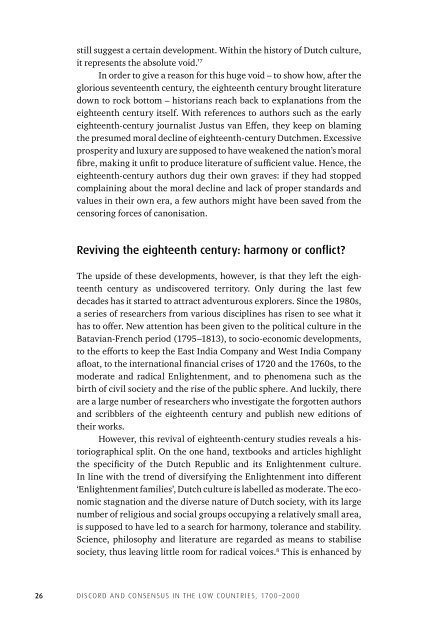Discord Consensus
7aze300jFJo
7aze300jFJo
You also want an ePaper? Increase the reach of your titles
YUMPU automatically turns print PDFs into web optimized ePapers that Google loves.
still suggest a certain development. Within the history of Dutch culture,<br />
it represents the absolute void.’ 7<br />
In order to give a reason for this huge void –to show how, after the<br />
glorious seventeenth century, the eighteenth century brought literature<br />
down to rock bottom –historians reach back to explanations from the<br />
eighteenth century itself. With references to authors such as the early<br />
eighteenth-century journalist Justus van Effen, they keep on blaming<br />
the presumed moral decline of eighteenth-century Dutchmen. Excessive<br />
prosperity and luxury are supposed to have weakened the nation’s moral<br />
fibre, making it unfit to produce literature of sufficient value. Hence, the<br />
eighteenth-century authors dug their own graves: if they had stopped<br />
complaining about the moral decline and lack of proper standards and<br />
values in their own era, a few authors might have been saved from the<br />
censoring forces of canonisation.<br />
Reviving the eighteenth century: harmony or conflict?<br />
The upside of these developments, however, is that they left the eighteenth<br />
century as undiscovered territory. Only during the last few<br />
decades has it started to attract adventurous explorers. Since the 1980s,<br />
a series of researchers from various disciplines has risen to see what it<br />
has to offer. New attention has been given to the political culture in the<br />
Batavian-French period (1795–1813), to socio-economic developments,<br />
to the efforts to keep the East India Company and West India Company<br />
afloat, to the international financial crises of 1720 and the 1760s, to the<br />
moderate and radical Enlightenment, and to phenomena such as the<br />
birth of civil society and the rise of the public sphere. And luckily, there<br />
are a large number of researchers who investigate the forgotten authors<br />
and scribblers of the eighteenth century and publish new editions of<br />
their works.<br />
However, this revival of eighteenth-century studies reveals a historiographical<br />
split. On the one hand, textbooks and articles highlight<br />
the specificity of the Dutch Republic and its Enlightenment culture.<br />
In line with the trend of diversifying the Enlightenment into different<br />
‘Enlightenment families’, Dutch culture is labelled as moderate. The economic<br />
stagnation and the diverse nature of Dutch society, with its large<br />
number of religious and social groups occupying a relatively small area,<br />
is supposed to have led to a search for harmony, tolerance and stability.<br />
Science, philosophy and literature are regarded as means to stabilise<br />
society, thus leaving little room for radical voices. 8 This is enhanced by<br />
26<br />
DISCORD AND CONSENSUS IN THE LOW COUNTRIES, 1700–2000


